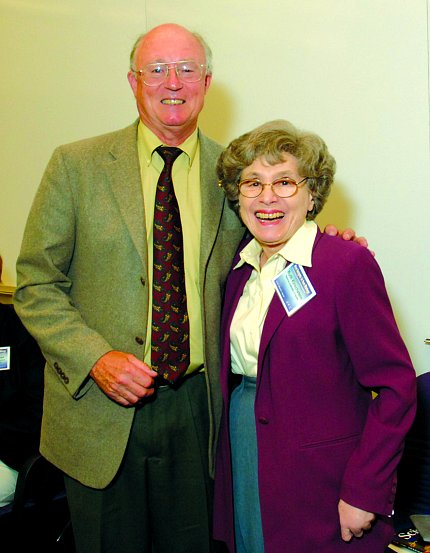Former NIDDK Program Director Badman Remembered

Dr. David Badman, retired hematology grants program director at the National Institute of Diabetes and Digestive and Kidney Diseases, passed away on Oct. 12 at his home in rural Maryland. He had been in hospice care for a short while due to pancreatic cancer. He was 81 years old.
Although he had officially retired Jan. 1, 2005, after 30-plus years at NIH, Badman continued to work on an NIH Roadmap drug development project until well into 2006. That May, NIDDK held a symposium, “New Insights in Iron Biology,” and reception in his honor, hailing him as “a relentless advocate for iron research.”
In a career spanning more than three decades, Badman advanced research on iron overload in children with sickle cell anemia, among his many accomplishments in NIDDK’s Division of Kidney, Urologic and Hematologic Diseases. He was also proud of his work promoting stem cell research and of innovating the use of zebrafish in research for diabetes and kidney disease.
Colleagues remember Badman for being intellectually curious and his kind and helpful mentorship of new investigators.
“From the earliest days of my career, even before I came to NIH and applied for an NIDDK training grant in David’s hematology program, he became a role model in many ways,” said NIDDK Director Dr. Griffin Rodgers. “As an exemplary leader, researcher and colleague, he brought compassion, determination and an unrivaled resourcefulness to every role, touching so many lives along the way. The world is surely a better place because of David’s legacy.”
Badman was born on Dec. 7, 1941. He graduated from the University of Wisconsin-Madison with a B.S. degree in biology. He earned his M.S. and Ph.D. degrees at the University of Florida.
Badman taught biochemistry and physiology at Kalamazoo College in Michigan, before being recruited to NIH for its Grants Associate Program, which trained a select few health scientist administrators. During the internship, he adopted a “can-do” attitude from his mentor, then-NIGMS director Dr. Ruth Kirschstein.
Upon retirement, he oversaw the NIH program Rapid Access to Interventional Development (NIH-RAID), part of then-NIH Director Elias Zerhouni’s Roadmap for Medical Research that aimed to facilitate clinical research in order to develop new therapeutic agents.
During his NIH career, Badman also valued traveling the country, promoting the importance of scientific research and the work of NIH.
Survivors include his wife Paulette, stepdaughter Kristina, grandson Christopher (Carmen) Novel, and great-grandsons Jayden and Christopher; as well as sisters Shirley Flottum and Kathryn (Mark) Dopkins, niece Lynn Cornell and nephew Wesley Dopkins.
